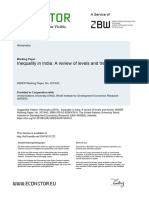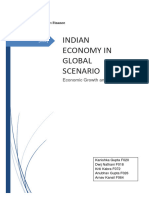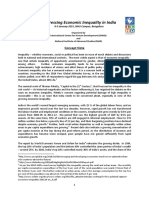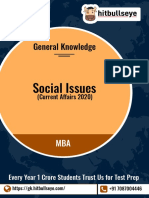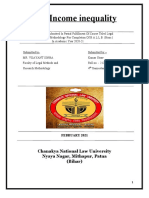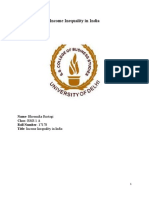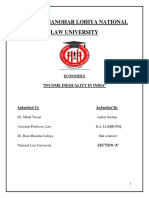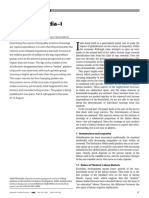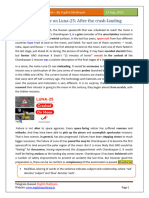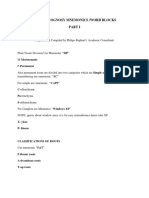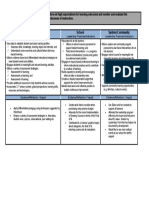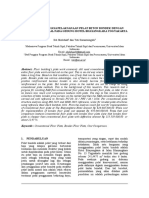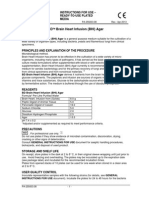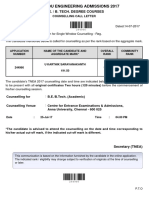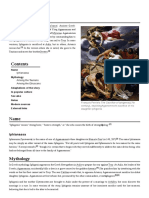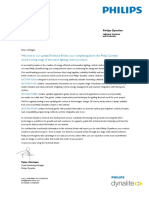Thomas Piketty Has The Right Diagnosis
Uploaded by
mrchiku1998Thomas Piketty Has The Right Diagnosis
Uploaded by
mrchiku1998The Indian Express Editorial – By English Madhyam 26 Dec 2024
Thomas Piketty has the right diagnosis, wrong prescription
French economist Thomas Piketty is right that inequality isn’t a “rich country concern” and India
shouldn’t wait to become richer before addressing what is definitely a serious issue. Whether
inequality in India is widening is a moot point. Official household consumption expenditure surveys
show a decline in the Gini coefficient between 2011-12 and 2022-23 for rural and urban areas. In other
words, consumption inequality has reduced. The same may not be true with income and wealth
inequality, which would well have gone up in the past decade or more. That, if so, isn’t good not just
from a moral, social or political, but also economic standpoint. Leveraging the market potential of
India’s large population cannot happen without incomes rising at the bottom of the pyramid. Less
inequality and the aspiring poor having more money to spend is desirable even from a hard-nosed
business perspective; ask any FMCG, two-wheeler or micro-finance company executive.
Piketty is equally right with his diagnosis. The real inequality is one of opportunity. A large part of
India’s population suffers from a lack of access to quality education, health, nutrition and sanitation
facilities. It makes them less productive. Incomes are ultimately a function of productivity — how
much output and value a worker adds from economic activity. Incomes cannot rise without
productivity improving. If the bulk of the workforce is, as Piketty notes, “stuck in a low productivity
trap”, they cannot contribute to growth nor partake of its fruits. That’s all the more reason, then, why
India needs to reduce inequality — in this case, of opportunity — early enough. It calls for increasing
public investment in good schools, hospitals, provision of clean drinking water, human waste disposal
and sewage treatment systems, and other physical and social infrastructure — much more than what
the Centre and states are doing now.
Where Piketty, however, is wrong is in his prescription of taxing the wealth, and not just incomes, of
the rich. Much of the Forbes billionaires’ wealth is held as shares in the companies promoted by them.
This is paper wealth that can be realised only when the shares are sold. It’s one thing to tax incomes,
capital gains from property or share sales, and goods and services transactions — which are all “flow”
variables. Taxing unrealised wealth – which is a “stock” — is unnecessary. The tax reforms of recent
times have helped broaden the base and reduce evasion. There’s enough scope to raise additional
resources from the already existing avenues, including through better enforcement and advanced
analytics. The last thing India needs is a new tax that will create more disruptions than revenues for
funding essential public goods. s[Practice Exercise]
Red/blue coloring of words in the sentence indicates subject verb relationship; where ‘red’
denotes ‘subject’ and ‘blue’ denotes ‘verb’.
Telegram channel: English Madhyam.
Website: www.englishmadhyam.info Page 1
The Indian Express Editorial – By English Madhyam 26 Dec 2024
Vocabulary
1. Diagnosis (noun) – Identification, 11. Hard-nosed (adjective) – Practical, tough-
assessment, evaluation, analysis, detection minded, realistic, pragmatic, determined
2. Inequality (noun) – Disparity, imbalance, 12. Perspective (noun) – Viewpoint, outlook,
difference, inequity, unevenness angle, approach, frame of reference
3. Address (verb) – Deal with, tackle,
manage, resolve, handle 13. Productive (adjective) – Efficient, effective,
fruitful, industrious, profitable
4. Moot (adjective) – Debatable, arguable,
questionable, uncertain, unsettled 14. Partake (of) (verb) – Participate, engage,
share, consume, take part
5. Gini coefficient (noun) – A measure of 15. Call for (phrasal verb) – Demand, require,
economic inequality in income or wealth request, necessitate, appeal for
distribution
16. Waste disposal (noun) – Removal of
6. Decade (noun) – A period of ten years unwanted materials, trash management,
श waste management, garbage clearance
7. Standpoint (noun) – Perspective,
viewpoint, position, opinion, attitude 17. Tax (verb) – Levy, impose, charge, assess,
collect
8. Leverage (verb) – Utilize, exploit, 18. Capital gain (noun) – Profit from the sale
maximize, apply, capitalize on of assets such as property or stocks
9. Potential (noun) – Capacity, ability,
capability, possibility, promise 19. Variable (noun) – a situation, number or
quantity that can vary or be varied
10. The bottom of the pyramid (noun) – The
poorest socio-economic group in society
20. Broaden the base (noun) – Expand the
foundation, increase participation, widen
coverage, enhance scope
Telegram channel: English Madhyam.
Website: www.englishmadhyam.info Page 2
The Indian Express Editorial – By English Madhyam 26 Dec 2024
21. Evasion (noun) – Avoidance, escape, 25. Enforcement (noun) – Implementation,
dodging, circumvention, non-compliance execution, application, regulation, policing
22. Scope (noun) – Range, extent, capacity, 26. Disruption (noun) – Disturbance,
area, possibility interruption, break, disorder, upheaval
23. Existing (adjective) – Present, current,
active, operational, in place 27. Essential (adjective) – Necessary, crucial,
vital, important, indispensable
24. Avenue (noun) – Pathway, method,
option, route, channel
Telegram channel: English Madhyam.
Website: www.englishmadhyam.info Page 3
The Indian Express Editorial – By English Madhyam 26 Dec 2024
Summary of the Editorial
1. Piketty’s Diagnosis on Inequality: Thomas Piketty correctly observes that inequality is a
universal issue, not confined to rich countries, and India must address it urgently.
2. Inequality in India: While consumption inequality, as measured by the Gini coefficient,
has decreased between 2011-12 and 2022-23, income and wealth inequality may have
risen.
3. Economic Implications: Rising inequality is problematic not just socially and morally but
also economically, as leveraging India’s market potential depends on increasing incomes
at the bottom.
4. Business Perspective: Reducing inequality boosts the purchasing power of the aspiring
poor, benefiting businesses, especially in sectors like FMCG, two-wheelers, and micro-
finance.
5. Opportunity Inequality: The core issue in India is inequality of opportunity, stemming
from limited access to quality education, healthcare, and basic amenities.
6. Productivity Link: Incomes are tied to productivity, which is hindered when a significant
portion of the workforce lacks proper resources and remains in a low-productivity trap.
7. Public Investment Needs: To improve opportunities, India must significantly increase
public investments in schools, hospitals, clean drinking water, sanitation, and other
social infrastructure.
8. Current Efforts Insufficient: The present investment by the Centre and states in physical
and social infrastructure is inadequate to address inequality of opportunity effectively.
9. Piketty’s Taxation Prescription: Piketty suggests taxing the wealth of the rich, but this
proposal is flawed and unnecessary.
10. Wealth vs. Income Taxation: Wealth, especially billionaire wealth, is often tied up in
shares and unrealized assets, which are paper valuations, not actual flows of income.
11. Practical Taxation: Taxing income, capital gains, and transactions — all flow variables —
is a more effective approach than taxing unrealized wealth.
12. India’s Tax Reforms: Recent tax reforms in India have broadened the base and reduced
evasion, creating opportunities for raising additional resources.
13. Better Enforcement: Improved tax enforcement and the use of advanced analytics can
generate more revenue from existing systems without introducing new taxes.
14. Disruption Concerns: Introducing a wealth tax could cause economic disruptions and
yield limited revenue, which is counterproductive for funding essential public goods.
15. Key Takeaway: While addressing inequality is critical for India’s development, the focus
should be on enhancing opportunities and improving existing tax systems rather than
creating new wealth taxes.
Telegram channel: English Madhyam.
Website: www.englishmadhyam.info Page 4
The Indian Express Editorial – By English Madhyam 26 Dec 2024
Practice Exercise: SSC Pattern Based
1. What is the tone of the passage? [Editorial Page]
A. Alarmist
B. Complacent
C. Light-hearted
D. Analytical
2. According to the passage, what is the "real inequality" that Thomas Piketty highlights in
the Indian context?
A. Wealth and income inequality
B. Inequality of opportunity
C. Inequality in market potential
D. Inequality in consumer spending
3. What trend does the official household consumption expenditure survey reveal between
2011-12 and 2022-23 in India?
A. Income inequality has reduced.
B. Wealth inequality has widened.
C. Consumption inequality has reduced.
D. Gini coefficient has remained constant.
4. According to the passage, incomes are ultimately a function of __________.
A. Desire
B. Luck
C. Inheritance
D. Productivity
5. Direction: Identify the statement that is TRUE based on the author’s argument about
wealth taxation.
Which of the following statements accurately reflects the author’s viewpoint about taxing
the rich?
A. Taxing unrealized wealth (paper wealth) is necessary for India to fund public goods.
B. Reducing inequality of opportunity requires significant public investment in social
infrastructure.
C. The author believes taxing capital gains from share sales is unnecessary for revenue
generation.
D. The author endorses a new wealth tax to create fewer disruptions in the economy.
6. Select the option that can be used as a one-word substitute for the given group of words.
The study of ancient things such as art, graves, ruins etc
A. Archaeology
B. Meteorology
C. Geology
Telegram channel: English Madhyam.
Website: www.englishmadhyam.info Page 5
The Indian Express Editorial – By English Madhyam 26 Dec 2024
D. Astrology
7. Select the most appropriate option that can substitute the underlined segment in the
given sentence.
No sooner did Mr. Piyahri Mishra finish his chemistry lecture that the students began to
leave
A. so the students began to leave.
B. than the students began to leave.
C. then the students began to leave.
D. and the students began to leave
8. Select the most appropriate synonym of the given word.
Miraculous
A. Average
B. Draining
C. Expected
D. Incredible
9. Select the most appropriate option to substitute the underlined segment in the given
sentence.
After reflecting on the matter regarding his boss’s selfish attitude, Raju decided to force
himself to perform an unpleasant action in a difficult situation in order to resolve the
matter.
A. ignore the bullet
B. shoot the bullet
C. dodge the bullet
D. bite the bullet
10. Select the most appropriate synonym of the given word.
Magnificent
A. Sacred
B. Splendid
C. Slow
D. Scared
11. Select the most appropriate synonym of the given word.
Beseech
A. Bequeath
B. Pamper
C. Implore
D. Impart
12. Select the term which means the same as the given group of words.
A continuing unpleasant situation, created when one problem causes another problem
that then makes the first problem worse
A. Vicious cycle
Telegram channel: English Madhyam.
Website: www.englishmadhyam.info Page 6
The Indian Express Editorial – By English Madhyam 26 Dec 2024
B. Enclosed cycle
C. Repetitive cycle
D. Round cycle
13. Select the option that expresses the given sentence in passive voice.
The school will hire new teachers
A. New teachers are hired by the school.
B. The school will be hiring new teachers.
C. New teachers will join the school.
D. New teachers will be hired by the school
14. Select the most appropriate ANTONYM of the given word.
Absolve
A. Commend
B. Accuse
C. Excuse
D. Appeal
15. Select the option that can be used as a one-word substitute for the given group of words.
A person who has supreme power or authority
A. Diversity
B. Secular
C. Sovereign
D. Foreign
16. Select the option that corrects the error in the given sentence.
She sings good
A. well
B. goodly
C. better
D. best
17. Select the option that expresses the given sentence in passive voice.
Meenakshi could have sent a reply.
A. A reply could have be sent by Meenakshi.
B. A reply could have been sent by Meenakshi.
C. A reply could have been send by Meenakshi.
D. A reply could have sent by Meenakshi.
18. Select the most appropriate ANTONYM of the given word.
Appreciate
A. Depict
B. Esteem
C. Depreciate
D. Acknowledge
19. Select the most appropriate option to fill in the blank.
The US ________ building was built in the year 1800.
Telegram channel: English Madhyam.
Website: www.englishmadhyam.info Page 7
The Indian Express Editorial – By English Madhyam 26 Dec 2024
A. capital
B. captain
C. capitol
D. cannibal
20. Select the option that can be used as a one-word substitute for the given group of words.
Lack of interest, enthusiasm or concern
A. Antipathy
B. Apathy
C. Empathy
D. Sympathy
Comprehension:
In the following passage, some words have been deleted. Read the passage carefully and
select the most appropriate option to fill in each blank.
Augmented reality and virtual reality are two types of reality technologies that either
augment or replace a real-world environment with a (1)________ one. In augmented reality,
a virtual environment coexists (2)________ the actual world, to be instructive and offer
more data about the real world that a user can access without having to search. When a
handset is pointed at a piece of malfunctioning (3)________, for example, industrial AR apps
might provide rapid troubleshooting information. Virtual reality is a (4)________
environmental simulation that completely replaces the user's surroundings with a totally
virtual world. For example, VR may provide a user with a box containing a cartoon
(5)________ of Mike Tyson in a virtual boxing ring.
21. Select the most appropriate option to fill in blank number 1.
A. suffocated
B. revealed
C. simulated
D. catered
22. Select the most appropriate option to fill in blank number 2.
A. with
B. along
C. beyond
D. behind
23. Select the most appropriate option to fill in blank number 3.
A. arsenal
B. baggage
C. outfit
D. equipment
24. Select the most appropriate option to fill in blank number 4.
A. conclusive
B. comprehensive
Telegram channel: English Madhyam.
Website: www.englishmadhyam.info Page 8
The Indian Express Editorial – By English Madhyam 26 Dec 2024
C. reprehensive
D. transgressive
25. Select the most appropriate option to fill in blank number 5.
A. glossary
B. resistance
C. rendition
D. network
Telegram channel: English Madhyam.
Website: www.englishmadhyam.info Page 9
The Indian Express Editorial – By English Madhyam 26 Dec 2024
Answers
1. D 2. B 3. C 4. D 5.B 6. A 7.B 8. D 9. D 10. B 11.C
12. A 13.D 14.B 15.C 16.A 17.B 18.C 19.C 20.B 21.C 22.A
23. D 24.B 25. C [Practice Exercise]
Explanations
1. D) Analytical
The passage critically examines Thomas Piketty’s diagnosis on inequality and discusses why his
solution (wealth tax) may be unsuitable for India. The writer uses factual data (e.g., Gini
coefficients) and evaluates different viewpoints, which shows an analytical approach rather than
an emotional or casual tone.
A: The author does not sensationalize the issue but rather evaluates it in a reasoned, data-
driven manner.
B: The author is neither indifferent nor dismissive; they recognize inequality as a serious
concern that needs addressing.
C: The passage deals with serious socio-economic issues and is not written in a humorous or
informal style.
2. B) Inequality of opportunity
The passage explicitly mentions that Piketty highlights the "real inequality" as one of
opportunity, particularly due to the lack of access to quality education, health, nutrition, and
sanitation facilities.
A: Incorrect. While wealth and income inequality are mentioned, the passage does not describe
them as the "real inequality."
C: Incorrect. Market potential is discussed in terms of leveraging the population's income but is
not presented as the primary inequality.
D: Incorrect. Consumer spending is linked to income disparity but not described as the core
inequality in the passage.
3. C) Consumption inequality has reduced
The passage states that the Gini coefficient, which measures inequality, declined for rural and
urban areas during this period, indicating a reduction in consumption inequality.
A: Incorrect. The passage suggests that income inequality may have widened, not reduced.
B: Incorrect. The passage mentions that wealth inequality may have increased, not reduced.
D: Incorrect. The Gini coefficient declined, which signifies a change (reduction), not constancy.
4. D) Productivity
A (Desire): Incorrect because the passage emphasizes that incomes depend on how much
output/value a worker adds, not on mere wants or desires.
B: Incorrect because the author does not suggest that chance dictates incomes; rather, it is tied
directly to one's contribution and skills.
Telegram channel: English Madhyam.
Website: www.englishmadhyam.info Page 10
The Indian Express Editorial – By English Madhyam 26 Dec 2024
C: Incorrect because the passage focuses on the productivity of the current workforce rather
than wealth passed down through families.
D: Correct because the passage explicitly states that incomes are "ultimately a function of
productivity."
5. B) Reducing inequality of opportunity requires significant public investment in social
infrastructure.
A: Incorrect because the author argues that taxing unrealized wealth ("paper wealth") is
unnecessary and can cause more disruptions than revenue benefits.
B: Correct as per the passage, which strongly advocates for investing in schools, hospitals, and
other social/physical infrastructure to reduce inequality of opportunity.
C: Incorrect because the passage actually supports taxing flows like capital gains but not
unrealized wealth.
D: Incorrect because the author explicitly states that a new wealth tax on unrealized assets
could create more problems (disruptions) than revenue
6. A) Archaeology (noun) – The study of ancient things such as art, graves, ruins, etc. ऩुयातत्तत्तव
Meteorology (noun) – The science that deals with the atmosphere and its phenomena,
especially weather and weather forecasting. भौसभ ववऻान
Geology (noun) – The science that deals with the Earth's physical structure and substance,
its history, and the processes that act on it. बवू वऻान
Astrology (noun) – The study of the movements and relative positions of celestial bodies
interpreted as having an influence on human affairs and the natural world. ज्मोततष
7. B) than the students began to leave
that’ के फदरे ‘than’ का प्रमोग होगा क्मोंकक "No sooner" के फाद "than" का प्रमोग ककमा जाता है। मह
एक सॊयचना है जजसका उऩमोग दो घटनाओॊ के तयु ॊ त एक के फाद दस
ू यी के होने को दर्ााने के लरए ककमा
जाता है ; जैस—
े No sooner did the bell ring than the students rushed out.
‘than’ will be used instead of ‘that’ because after "No sooner," the correct conjunction is "than."
This is a structure used to show that two events happened in quick succession; like— No sooner
did the bell ring than the students rushed out.
8. D) Miraculous (adjective) – Extraordinary, amazing, supernatural, phenomenal, अद्भत
ु
Synonym: Incredible (adjective) – Unbelievable, extraordinary, amazing, fantastic, अववश्वसनीम
Average (adjective) – Normal, typical, ordinary, साभान्म
Draining (adjective) – Exhausting, tiring, weakening, थकाने वारा
Expected (adjective) – Likely, anticipated, predictable, अऩेक्षऺत
Telegram channel: English Madhyam.
Website: www.englishmadhyam.info Page 11
The Indian Express Editorial – By English Madhyam 26 Dec 2024
9. D) bite the bullet (idiom) – To force oneself to endure something unpleasant or difficult, usually
because it is unavoidable or necessary. कठिन ऩरयजथथततमों का साभना कयना।
10. B) Magnificent (adjective) – Grand, impressive, splendid, superb, spectacular. बव्म
Synonym: Splendid (adjective) – Very impressive, excellent, magnificent, grand. र्ानदाय
Sacred (adjective) – Holy, divine, connected with God. ऩववत्र
Slow (adjective) – Not fast, lacking speed, sluggish. धीभा
Scared (adjective) – Afraid, frightened, fearful. डया हुआ
11. C) Beseech (verb) – To urgently and fervently ask someone for something; to beg or plead
earnestly. लभनतत कयना, प्राथाना कयना
Synonym: Implore (verb) – To beg someone earnestly or desperately to do something. ववनती
कयना, गगड़गगड़ाना
Bequeath (verb) – To leave property or money to someone through a will. वसीमत कयना
Pamper (verb) – To indulge with every attention, comfort, and kindness; spoil. बफगाड़ना, राड़
कयना
Impart (verb) – To give or convey something, especially knowledge or information. प्रदान
कयना, फताना
12. A) Vicious cycle (noun) – A continuing unpleasant situation, created when one problem causes
another problem that then makes the first problem worse. दष्ु चक्र
Enclosed cycle (noun) – A cycle that is enclosed or surrounded, but it doesn't capture the
idea of problems causing each other. फॊद चक्र
Repetitive cycle (noun) – A cycle that repeats itself, but it doesn't emphasize the worsening
of problems. दोहयामा जाने वारा चक्र
Round cycle (noun) – A circular process, but it lacks the negative connotation of problems
worsening. गोराकाय चक्र
13. D) New teachers will be hired by the school
Active Voice को Passive Voice भें फदरने के लरए (Object + Auxiliary Verb + Past Participle + by +
Subject) का प्रमोग ककमा जाता है । sentence ‘The school will hire new teachers’ को Passive Voice भें
फदरते सभम Object ‘new teachers’ को वाक्म की र्रु
ु आत भें यखा जाता है । Verb ‘will hire’ को Passive
Voice भें फदरकय ‘will be hired’ ककमा जाता है । Subject ‘the school’ को अॊत भें ‘by the school’ के रूऩ
भें यखा जाता है ।
Telegram channel: English Madhyam.
Website: www.englishmadhyam.info Page 12
The Indian Express Editorial – By English Madhyam 26 Dec 2024
To convert Active Voice into Passive Voice, the structure (Object + Auxiliary Verb + Past Participle
+ by + Subject) is used. In the sentence ‘The school will hire new teachers’, the object ‘new
teachers’ is placed at the beginning, and the verb ‘will hire’ is changed to ‘will be hired’. The
subject ‘the school’ is placed at the end as ‘by the school’.
14. B) Absolve (verb) – To set or declare someone free from blame, guilt, or responsibility. दोषभुक्त
कयना
Antonym: Accuse (verb) – To charge someone with an offense or crime, blame, or hold
responsible. दोषी िहयाना
Commend (verb) – To praise formally or officially. प्रर्ॊसा कयना
Excuse (verb) – To forgive someone for a fault or offense. ऺभा कयना
Appeal (verb) – To make a serious or urgent request, typically to the public or higher
authority. अऩीर कयना
15. C) Sovereign (noun) – A person who has supreme power or authority. सवोच्च सत्तता यखने वारा
व्मजक्त
• Diversity (noun) – The state of being diverse; variety. ववववधता
• Secular (adjective) – Not connected with religious or spiritual matters. धभातनयऩेऺ
• Foreign (adjective) – From another country or nation. ववदे र्ी
16. A) ‘good' के फदरे 'well' का प्रमोग होगा क्मोंकक 'sings' verb को qualify कयने के लरए adverb की
आवश्मकता होती है औय 'well' सही adverb है । 'good' adjective है , जो महाॉ सही नहीॊ है ; जैस—
े She
sings well.
'well' will be used instead of 'good' because to qualify the verb 'sings', an adverb is required,
and 'well' is the correct adverb. 'good' is an adjective, which is not appropriate here; Like— She
sings well.
17. B) A reply could have been sent by Meenakshi
Active Voice को Passive Voice भें फदरने के लरए (Object + Modal Verb + Have + Been + Past
Participle + by + Subject) का प्रमोग ककमा जाता है । वाक्म ‘Meenakshi could have sent a reply’ को
Passive Voice भें फदरते सभम Object ‘a reply’ को वाक्म की र्रु
ु आत भें यखा जाता है । Verb ‘could
have sent’ को Passive Voice भें फदरकय ‘could have been sent’ ककमा जाता है । Subject ‘Meenakshi’
को अॊत भें ‘by Meenakshi’ के रूऩ भें यखा जाता है ।
To convert Active Voice into Passive Voice, the structure (Object + Modal Verb + Have + Been +
Past Participle + by + Subject) is used. In the sentence ‘Meenakshi could have sent a reply’, the
Telegram channel: English Madhyam.
Website: www.englishmadhyam.info Page 13
The Indian Express Editorial – By English Madhyam 26 Dec 2024
object ‘a reply’ is placed at the beginning, and the verb ‘could have sent’ is changed to ‘could
have been sent’. The subject ‘Meenakshi’ is placed at the end as ‘by Meenakshi’.
18. C) Appreciate (verb) – to recognize the worth, quality, or importance of something, to value
highly, to praise. सयाहना कयना, कद्र कयना
Antonym: Depreciate (verb) – to reduce the value or importance of something, to belittle, to
criticize. भूल्म घटाना, भहत्तत्तव घटाना
Depict (verb) – to describe or show in a picture, to represent. गचत्रण कयना, वणान कयना
Esteem (verb) – to regard with respect or admiration, to value highly. आदय कयना
Acknowledge (verb) – to accept or admit the existence or truth of something, to
recognize. भान्मता दे ना, थवीकाय कयना
19. C) Capitol का use होगा क्मोंकक मह ववर्ेष रूऩ से उस इभायत को सॊदलबात कयता है जहाॉ अभेरयका की
सयकाय काभ कयती है। sentence भें अभेरयकी इभायत के तनभााण का उल्रेख ककमा गमा है , इसलरए
'Capitol' सही है । जफकक 'Capital' का अथा है कोई याजधानी मा ववत्ततीम सॊसाधन, 'Captain' का अथा है
ककसी टीभ का नेता मा अगधकायी, औय 'Cannibal' का अथा है नयबऺी, जो इस context भें गरत हैं।
Capitol will be used because it refers to the specific building where the U.S. government
operates. The sentence mentions the construction of a U.S. building, so 'Capitol' is correct here.
Meanwhile, 'Capital' means a city that serves as a seat of government or financial resources,
'Captain' refers to a leader or officer of a team, and 'Cannibal' means someone who eats human
flesh, which don't fit in this context.
20. B) Apathy (noun) – Lack of interest, enthusiasm, or concern. उदासीनता
Antipathy (noun) – A deep-seated feeling of dislike; aversion. घण
ृ ा
Empathy (noun) – The ability to understand and share the feelings of another. सहानुबूतत
Sympathy (noun) – Feelings of pity and sorrow for someone else's misfortune. सहानुबूतत
21. C) Simulated" का उऩमोग होगा क्मोंकक इसका अथा होता है "अनुकयण मा नकरी रूऩ से तनलभात," जो इस
sentence के context भें सही है । Sentence भें मह फतामा जा यहा है कक augmented औय virtual reality
मा तो वाथतववक दतु नमा के environment को फदरती हैं मा उसे एक "नकरी" environment के साथ
replace कयती हैं। "Suffocated" का अथा है दभ घुटना, जो context भें सही नहीॊ है । "Revealed" का अथा है
प्रकट ककमा गमा, जो इस सॊदबा भें रागू नहीॊ होता क्मोंकक महाॉ replacement की फात हो यही है। "Catered"
का अथा होता है ककसी की ज़रूयत को ऩूया कयना, जो इस context भें उगचत नहीॊ है।
"Simulated" will be used because it means "artificially created or imitated," which fits the
context of the sentence. The sentence talks about augmented and virtual reality either
Telegram channel: English Madhyam.
Website: www.englishmadhyam.info Page 14
The Indian Express Editorial – By English Madhyam 26 Dec 2024
augmenting or replacing the real-world environment with a "fake" one. "Suffocated" means
"having difficulty breathing," which doesn't fit the context. "Revealed" means "shown or made
known," which isn't suitable here because the sentence is about replacing, not revealing.
"Catered" means "provided for needs," which doesn't fit the context either.
22. A) With' का उऩमोग होगा क्मोंकक "with" का अथा है साथ भें । महाॉ वाक्म भें फतामा गमा है कक "virtual
environment" असरी दतु नमा के साथ coexist कयता है , ताकक मूजय को अगधक जानकायी लभरे। 'Along'
का भतरफ है साथ-साथ चरते हुए, जो इस सॊदबा भें सही नहीॊ है। 'Beyond' का अथा है उससे आगे, औय
'Behind' का अथा है ऩीछे , जो इस वाक्म भें उगचत नहीॊ है।
With' will be used because "with" means together or alongside. The sentence mentions that a
virtual environment coexists with the actual world to provide more data. 'Along' means
alongside, which doesn't fit this context. 'Beyond' means further than, and 'Behind' means at
the back, which are incorrect here.
23. D) Equipment' का उऩमोग होगा क्मोंकक "equipment" का अथा होता है ककसी ववर्ेष कामा के लरए
इथतेभार होने वारे औजाय मा उऩकयण। महाॊ sentence भें एक हैंडसेट का उल्रेख है जजसे
malfunctioning (काभ न कयने वारी) चीज़ की ओय इॊगगत ककमा जा यहा है , इसलरए 'equipment' सही
ववकल्ऩ है । 'Arsenal' का अथा है हगथमायों का सॊग्रह, 'Baggage' का अथा है साभान, औय 'Outfit' का अथा है
कऩड़े मा ऩोर्ाक, जो इस context भें कपट नहीॊ फैिते।
'Equipment' will be used because "equipment" refers to tools or devices used for a specific
purpose. In the sentence, a handset is pointed at malfunctioning (not working) things, so
'equipment' is the correct choice. 'Arsenal' refers to a collection of weapons, 'Baggage' refers to
luggage, and 'Outfit' refers to clothing, none of which fit this context.
24. B) Comprehensive' का अथा होता है कुछ ऐसा जो सॊऩण
ू ा हो मा सबी ऩहरुओॊ को र्ालभर कयता हो। महाॊ
ऩय sentence भें फतामा गमा है कक वचअ
ुा र रयमलरटी एक ऩमाावयणीम simulation है जो मूजय की
surroundings को ऩयू ी तयह से फदर दे ती है , औय एक नमा, सॊऩण
ू ा आबासी सॊसाय ऩेर् कयती है। इसलरए
'comprehensive' महाॊ सही र्ब्द है । 'Conclusive' का अथा होता है अॊततभ मा तनणाामक, जो इस context भें
सही नहीॊ है। 'Reprehensive' का अथा होता है तनॊदा मोग्म, जो वाक्म के बाव से भेर नहीॊ खाता।
'Transgressive' का अथा होता है सीभाओॊ का उल्रॊघन कयना, जो महाॊ उऩमक्
ु त नहीॊ है ।
'Comprehensive' means something that is complete or includes all aspects. In the sentence, it is
mentioned that virtual reality is an environmental simulation that entirely replaces the user’s
surroundings, implying a complete, immersive virtual world. Hence, 'comprehensive' fits well
here. 'Conclusive' means decisive or final, which doesn’t fit this context. 'Reprehensive' means
Telegram channel: English Madhyam.
Website: www.englishmadhyam.info Page 15
The Indian Express Editorial – By English Madhyam 26 Dec 2024
deserving of criticism, which doesn't match the tone of the sentence. 'Transgressive' means
violating boundaries, which is also not suitable here.
25. C) Rendition' सही ववकल्ऩ है क्मोंकक इसका भतरफ है ककसी ववर्ेष व्मजक्त मा चीज़ का सॊथकयण मा
व्माख्मा, औय महाॉ Mike Tyson के एक वचअ
ुा र फॉजक्सॊग रयॊग भें एक वजान की फात हो यही है। Glossary'
का भतरफ र्ब्दकोर् होता है , जो इस सॊदबा भें कपट नहीॊ होता। 'Resistance' का भतरफ ववयोध होता है , जो
महाॉ वचअ
ुा र क़िगय के वणान से सॊफॊगधत नहीॊ है । 'Network' का भतरफ ककसी जुड़े हुए लसथटभ से होता है ,
जो महाॉ रागू नहीॊ होता।
Rendition' is the correct option because it refers to a specific version or interpretation, in this
case, a version of Mike Tyson in a virtual boxing ring. The context involves a virtual simulation,
so 'rendition' fits perfectly here. 'Glossary' refers to a list of terms and definitions, which
doesn't match the context. 'Resistance' refers to opposition or defiance, which is unrelated to
the description of a virtual figure. 'Network' refers to a system of interconnected elements,
which also does not fit here.
Telegram channel: English Madhyam.
Website: www.englishmadhyam.info Page 16
The Indian Express Editorial – By English Madhyam 26 Dec 2024
Telegram channel: English Madhyam.
Website: www.englishmadhyam.info Page 17
You might also like
- Income Inequality in India: Insights & SolutionsNo ratings yetIncome Inequality in India: Insights & Solutions2 pages
- Economic Inequality Is The Unequal Distribution of Income and Opportunity Between Different Groups in Society - 071934No ratings yetEconomic Inequality Is The Unequal Distribution of Income and Opportunity Between Different Groups in Society - 0719345 pages
- Inequality in India: A Review of Levels and Trends: Make Your Publications VisibleNo ratings yetInequality in India: A Review of Levels and Trends: Make Your Publications Visible29 pages
- Inequality, Employment & Policy AnalysisNo ratings yetInequality, Employment & Policy Analysis55 pages
- Q1. in Context of Inclusive Growth, How Far in India Growth Is Equitable. Critically CommentNo ratings yetQ1. in Context of Inclusive Growth, How Far in India Growth Is Equitable. Critically Comment8 pages
- Concept Note Addressing Economic Inequality in IndiaNo ratings yetConcept Note Addressing Economic Inequality in India4 pages
- Q1. in Context of Inclusive Growth, How Far in India Growth Is Equitable. Critically Comment. (10 Marks, 150 Words)No ratings yetQ1. in Context of Inclusive Growth, How Far in India Growth Is Equitable. Critically Comment. (10 Marks, 150 Words)7 pages
- Growth: Liberalisation. It Is Now Widely Acknowledged That The Resulting Structural Reforms Led ToNo ratings yetGrowth: Liberalisation. It Is Now Widely Acknowledged That The Resulting Structural Reforms Led To4 pages
- Unit 4 Read 4 Inequality - in - India - Full - Explanation - 18 - MarksNo ratings yetUnit 4 Read 4 Inequality - in - India - Full - Explanation - 18 - Marks3 pages
- 26.6.20 - Economic Inequality in India - A Brief AnalysisNo ratings yet26.6.20 - Economic Inequality in India - A Brief Analysis17 pages
- Income Inequality: Chanakya National Law University Nyaya Nagar, Mithapur, Patna (Bihar)No ratings yetIncome Inequality: Chanakya National Law University Nyaya Nagar, Mithapur, Patna (Bihar)34 pages
- PB 2018 6 Inequality in India On The RiseNo ratings yetPB 2018 6 Inequality in India On The Rise2 pages
- U2 - Economic Inequality and Poverty in IndiaNo ratings yetU2 - Economic Inequality and Poverty in India8 pages
- WorldInequalityLab WP2024 09 Income and Wealth Inequality in IndiaNo ratings yetWorldInequalityLab WP2024 09 Income and Wealth Inequality in India86 pages
- India's Inequality Problem - The India ForumNo ratings yetIndia's Inequality Problem - The India Forum7 pages
- Understanding Income Inequality in IndiaNo ratings yetUnderstanding Income Inequality in India4 pages
- Should India Prioritize GDP Growth or Income EqualityNo ratings yetShould India Prioritize GDP Growth or Income Equality10 pages
- General Studies 3: Economy, Agriculture AND InfrastructureNo ratings yetGeneral Studies 3: Economy, Agriculture AND Infrastructure116 pages
- (23!10!2020) DNS For CLAT 2021 On New PatternNo ratings yet(23!10!2020) DNS For CLAT 2021 On New Pattern6 pages
- 3 Delivery in The Health Care To The FilipinoNo ratings yet3 Delivery in The Health Care To The Filipino27 pages
- 2025 Campus Job Description - Ops - ConsolidatedNo ratings yet2025 Campus Job Description - Ops - Consolidated6 pages






